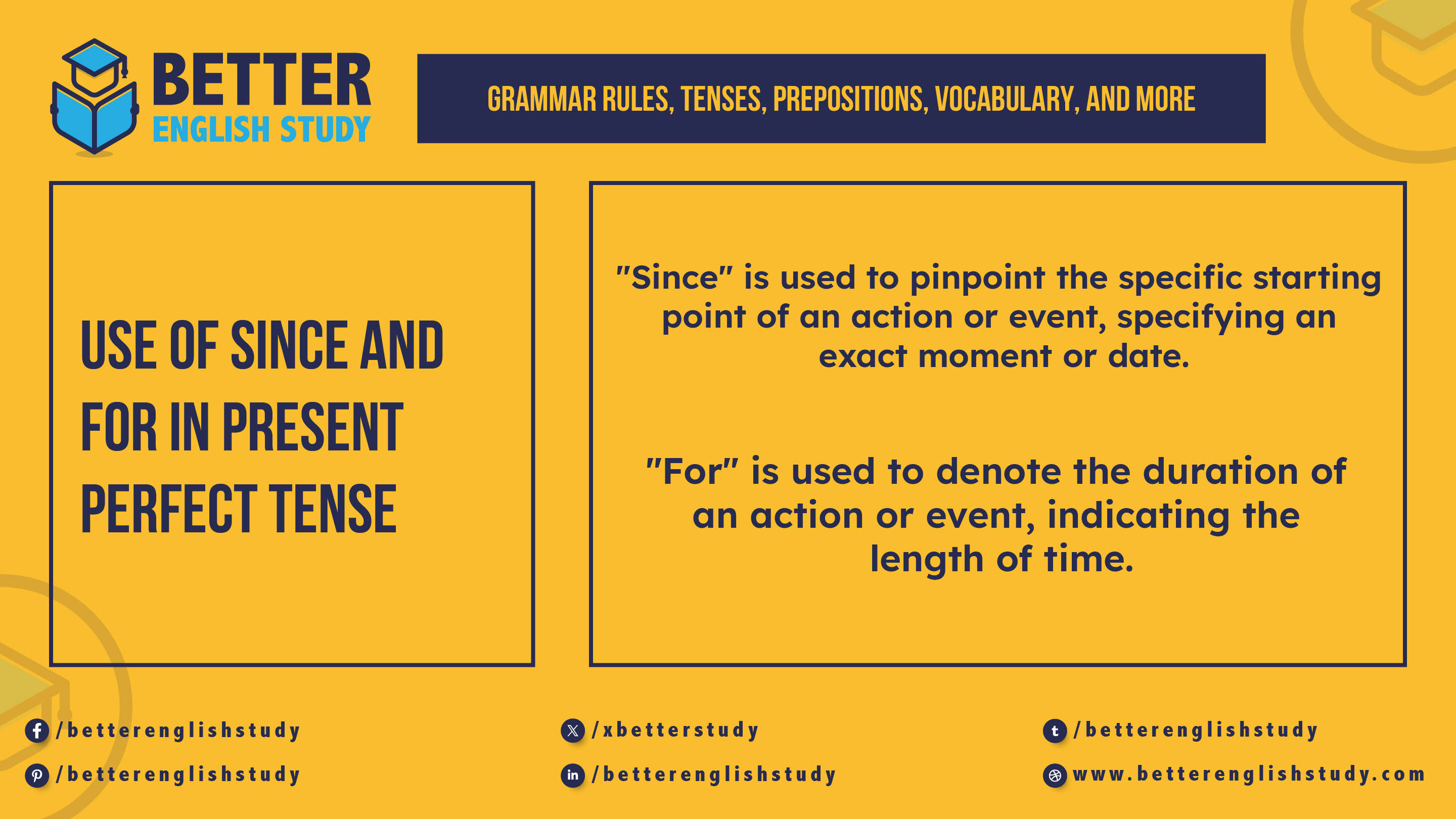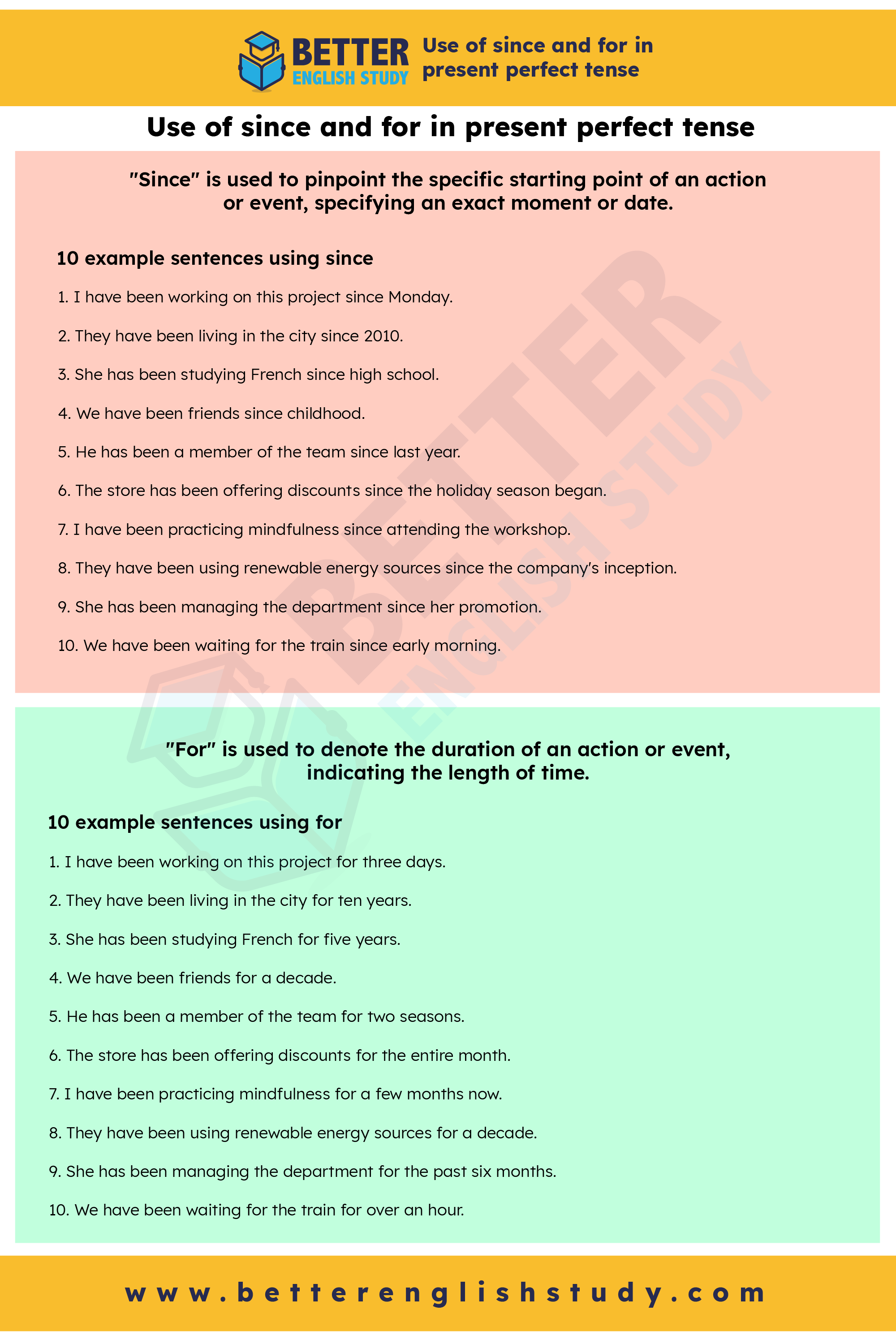
In English grammar, precision is paramount, especially when navigating the nuances of tenses. Understanding the correct usage of ‘for’ and ‘since’ in the present perfect tense is crucial for effective communication.
In this article, we will delve into the distinctions between these two prepositions, providing clarity and examples to empower English learners in their quest for grammatical proficiency.
In the present perfect tense, use “for” when expressing a duration of time and “since” when pinpointing the starting point of an action or event. “For” indicates the length of time, while “since” specifies the beginning moment.
Difference between for and since (When to use for and since)
“For” is used to denote the duration of an action or event, indicating the length of time, such as “They have been friends for a decade.”
On the other hand, “since” is used to pinpoint the specific starting point of an action or event, specifying an exact moment or date, like “She has been practicing yoga since sunrise.”
While “for” implies a continuous action over a period, “since” emphasizes the initiation of a particular event.
Duration vs. Starting Point
For: Use “for” when expressing the duration of an action or event. For example, “I have lived here for five years,” indicating the length of time.
Since: Employ “since” when pinpointing the starting point of an action or event. For instance, “I have lived here since 2017,” specifying the exact moment when the action began.
Time Specificity
For: “For” is often used with a specific period, such as hours, days, months, or years. “She has been working on the project for three hours.”
Since: “Since” is used with a specific point in time, typically a date or a specific moment. “He has been a member of the club since January.”
Continuous Action vs. Specific Event
For: Implies a continuous or ongoing action over a period. “They have been friends for a decade.”
Since: Indicates the initiation of a specific event at a particular time. “She has been practicing yoga since sunrise.”
Present Result of Past Action
For: Often used when a present result or consequence of a past action or event occurs. “They have been married for six months, and their bond is stronger than ever.”
Since: Also indicates a present result but emphasizes the specific starting point of the action. “She has been a chef since completing culinary school.”
10 example sentences using since
1. I have been working on this project since Monday.
2. They have been living in the city since 2010.
3. She has been studying French since high school.
4. We have been friends since childhood.
5. He has been a member of the team since last year.
6. The store has been offering discounts since the holiday season began.
7. I have been practicing mindfulness since attending the workshop.
8. They have been using renewable energy sources since the company’s inception.
9. She has been managing the department since her promotion.
10. We have been waiting for the train since early morning.

10 example sentences using for
1. I have been working on this project for three days.
2. They have been living in the city for ten years.
3. She has been studying French for five years.
4. We have been friends for a decade.
5. He has been a member of the team for two seasons.
6. The store has been offering discounts for the entire month.
7. I have been practicing mindfulness for a few months now.
8. They have been using renewable energy sources for a decade.
9. She has been managing the department for the past six months.
10. We have been waiting for the train for over an hour.
In mastering English grammar, the correct application of “for” and “since” in the present perfect tense is a valuable skill. By discerning the subtle distinctions and practicing their application, language learners can precisely convey temporal information.
Whether expressing the duration of action with “for” or indicating the starting point with “since,” the adept use of these prepositions contributes to effective communication and a refined command of the English language.
